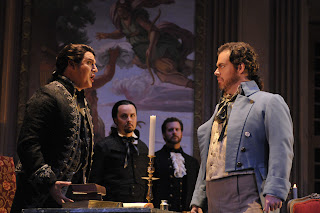 |
| Kara Shay Thomson & Jonathan Burton in Tosca. Photo by Patrick Pfister. |
By Giacomo Puccini
Libretto by Giuseppe Giacosa and Luigi Illica after the play by Victorien Sardou
Libretto by Giuseppe Giacosa and Luigi Illica after the play by Victorien Sardou
Directed by David Roth
Review by J. Barrett Cooper.
Entire contents copyright © 2012
J. Barrett Cooper. All rights reserved.
On Friday night, the
Kentucky Opera celebrated the opening of its Brown-Forman Sixtieth Anniversary
Season with a gala evening. Studded with tuxedos and evening gowns, the W. L. Lyons
Brown Theatre sparkled in all its glory – excitement and anticipation palpable
with the return of the Louisville Orchestra to the pit of the Brown, and the “Pope”
was out front to take pictures for the society papers. On first glance, one
might expect that what was about to happen would be only for the Society elite – that this evening’s pageantry would not be for the masses.
In one sense, they would be
correct. The finery sitting in the house might not be available or affordable
for most entertainment seekers. However, what was presented on the intimate
stage of the Brown would and should, in this humble reviewer's opinion, appeal
to anyone seeking to hear and experience a story that is both entertaining and
thought provoking.
Under the delicate direction
of Kentucky Opera’s General Director, David Roth, this offering of Giacomo
Puccini’s Tosca sets the bar high for the rest of the season and is one that
will be sure to bring back opera afficiandos and, hopefully, lovers of good
stories well told.
Set in early 19th century Kingdom
of Naples, during Napoleon's invasion, the story revolves around the love affair
of the artist Cavaradossi (Jonathan Burton) and his paramour, the jealous Tosca
(Kara Shay Thompson), an opera singer whose mercurial impetuosity is at once
humorous and aggravating yet, as seen in this production, masks a vulnerability
which leads to her tragic end. Cavaradossi, in attempting to aid an escaped political
prisoner, Angelotti (John Arnold), incurs the jealousy of his love Tosca and
the wrath of Chief of Police Baron de Scarpia, who is searching for the escaped
Angellotti and pursuing the physical love of Tosca.
 |
| Michael Chioldi & Jonathan Burton in Tosca. Photo by Patrick Pfister. |
The performances in this
beautifully crafted production are nothing if not understated and powerful. Burton’s
Cavaradossi is a man caught between the jealousy and love of Tosca and the
attempts of Scarpia to destroy him. Mr. Burton finds humor and agony as he
fends off the paranoia of his love and then is tortured and betrayed by both
Scarpia and Tosca. In the role of Tosca, Kara Shay Thompson returns to the
Kentucky Opera where two seasons ago she appeared in Cavallaria Rusticana, and
we can be thankful for that. Ms. Shay is superb. Her strong soprano voice is
able to capture all the delicacy and power that this role seems to call for:
soft and delicate, humor, beauty, wrath and pain. She is beautiful in the
sumptuous gowns designed by Howard Tvsi Kaplan.
But I believe the evening
belongs to Michael Chioldi’s portrayal of the villain Scarpia! Mr. Chioldi’s
warm, rich baritone is stunning. Physically imposing, he commands the stage
with ease and grace. While being the essence of an operatic villain (even one
time making a reference to Shakespeare’s Iago), Mr. Chioldi never makes us feel
as if we were watching a caricature. His scenes are solid and filled with
nuanced rage and pain. In "Va, Tosca!" ("Go, Tosca!") and "Già,
mi dicon venal" ("Yes, they say that I am venal"), the full range
of his talent and power are apparent. The beauty of Puccini is in full bloom
during the “Te Deum Laudamus” (“We Praise Thee, O God”), where Mr. Chioldi and
the Kentucky Opera Chorus bring the first act to a thundering end.
The supporting cast does
able work: Studio Artists Brad Raymond (Spoletta) and Greg Jebaily (Sciarrone). Noel
Bouley as Sacristan has some nice moments that add a lightness to the beginning, and John Arnold as Angelotti contrasts that with the urgency and fear that
pervades the town.
The Louisville Orchestra,
under the direction of returning Maestro Joseph Mechavich, is a welcome sight
and an aural delight. They’ve never sounded better.
Design in the production is
both bold and understated. Scenery was designed by Robert Little and is perfect
for the space. It was lit with a deft hand as that of Jeff Bruckerhoff.
Atmosphere and mood are expressed with subtlety and natural light sources are
enhanced with care. This adds to the production in an almost subliminal way.
Tosca
Friday, September 21, 8 p.m.
Sunday, September 23, 2 p.m.
Friday, September 28, 8 p.m.
Sunday, September 23, 2 p.m.
Friday, September 28, 8 p.m.
Kentucky Opera at
The Brown Theatre
315 W. Broadway
Louisville, KY 40202











